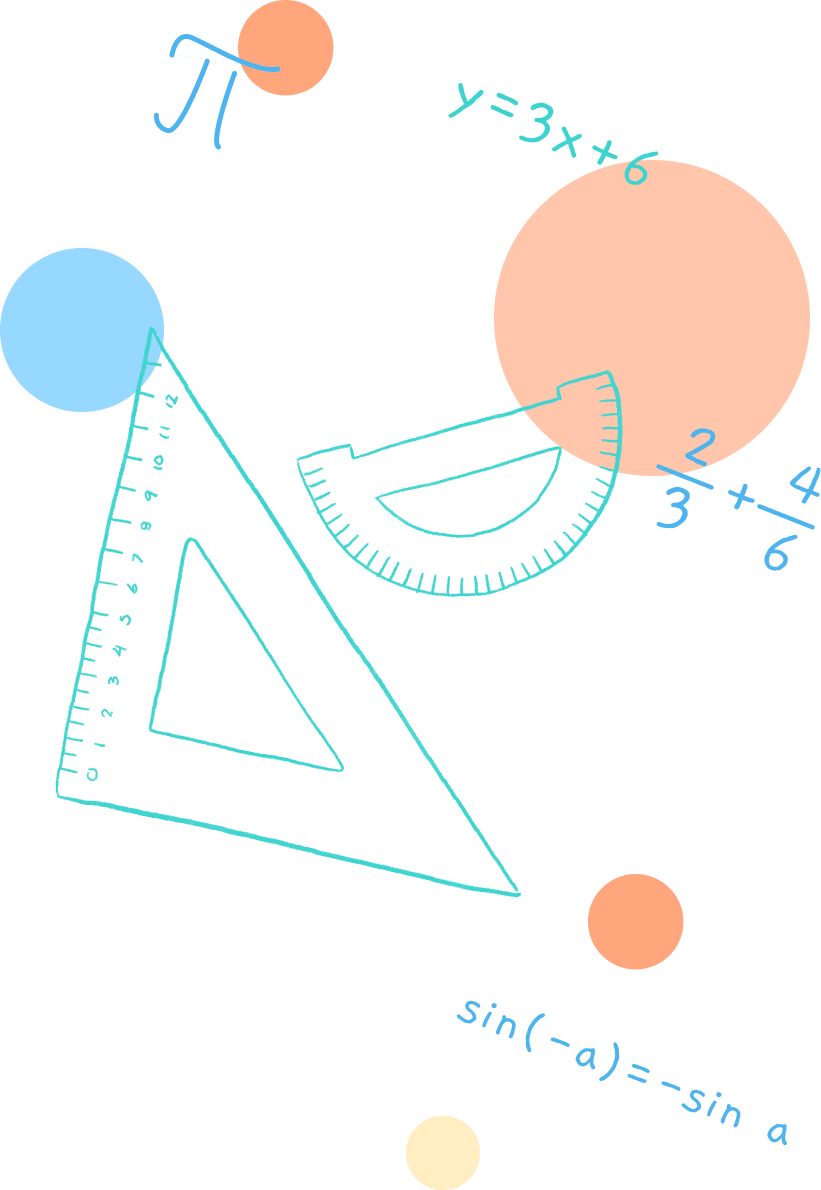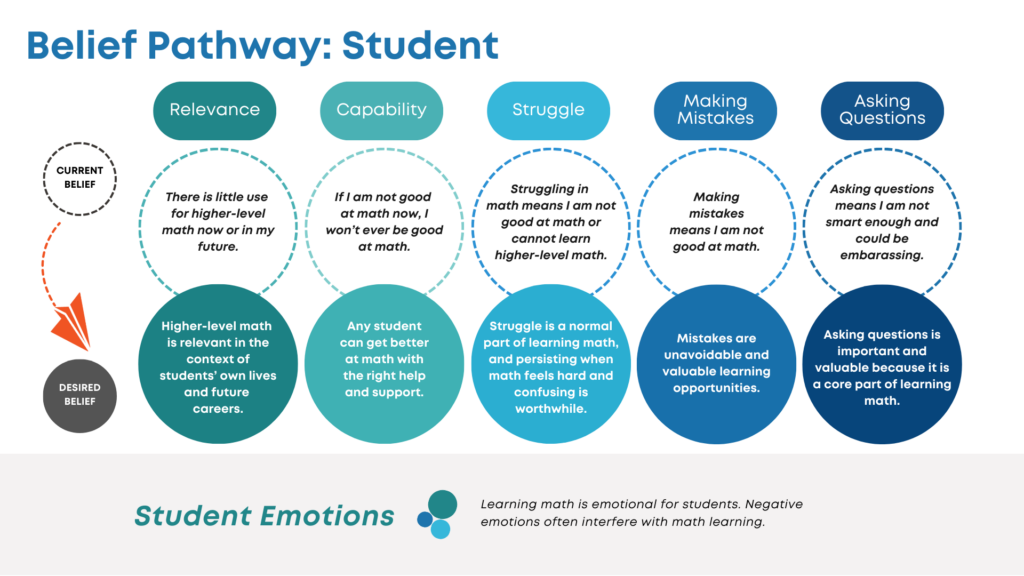Research Insights

Project Overview
The Math Narrative Project aims to advance an evidence-based messaging and narrative change strategy to improve math instruction and outcomes for 6th to 10th grade Black and Hispanic^ students of all incomes and Asian American and Pacific Islander (AAPI) and white students from lower-income backgrounds. The project focuses on these students, as they are most likely to encounter systemic barriers to accessing high-quality math education and math resources.
Insights from this research provide a rich evidence base for anyone working to strengthen math instruction and help students have better experiences learning math (e.g., math curriculum and technology designers, professional development and teacher prep, district leaders, or funders).
The Math Narrative Project has developed recommendations that provide messaging guidance for practitioners working with students, teachers, and parents* on how to effectively disrupt harmful narratives and replace them with more positive ones.
^ Consistent with what the research team heard in focus group discussions and in surveys, a 2022 Pew Research survey of 3,030 U.S. Hispanic adults found that 53 percent of Hispanics prefer to describe themselves as “Hispanic,” 26 percent prefer “Latino,” two percent prefer “Latinx,” and 18 percent have no preference.
*Throughout this website, the research team uses ‘parent’ to refer to both parents and guardians.
Top Insights
Among all three audiences — students, teachers, and parents — the research has yielded important insights about the nature of learning math.
- Learning and teaching math is a deeply emotional experience for students, parents, and teachers.
- Students’ experiences of learning math are informed by the context in which they live and learn — including, for instance, learning interruptions from COVID-19, home life outside of the classroom, or the lack of availability of outside help for math learning.
- Teachers and parents often struggle — and sometimes do not think there is a need — to make math feel relevant to students’ lives and futures.
- For many students and parents, struggling while learning math is perceived as negative and is often interpreted by others as an indication of one’s capability to do math.
- Teachers sometimes misinterpret students’ struggles learning math as “checked-out” behavior and may not always communicate to students that needing help is an inherent part of learning math.
In the sections below, you can read and download the comprehensive insights for each audience. Each section is accompanied by a corresponding “Belief Pathway,” which illustrates the current beliefs held by that audience and key desired beliefs necessary to improve students’ experiences learning math.
The Math Narrative Project asked students to reflect on the research insights. In the videos below, you can hear what students had to say about their experiences learning math.
Student Insights
Research Participants: 6th to 10th grade public school students (Black and Hispanic of all incomes, white and AAPI students from lower-income households) in California, Florida, New York, and Texas

You wouldn’t need the Pythagorean theorem to change a tire or something. It’s kind of useless sometimes.
Hispanic Male, Student, Texas
Source: MNP Student Qualitative Research
Many students believe that…
- …most adults don’t need higher-level math (like algebra or above) in their lives. Sometimes they even hear that from adults themselves.
- …higher-level math is only relevant to STEM careers or other highly specialized and technical fields/careers.
- …making mistakes or not immediately “getting” new math concepts means they are not good at math.
- …asking questions is embarrassing and means they are not smart enough to learn math.
- …struggling to learn math is a sign that they are not good at math.
- …If they are not good at math, they will never get better.
Many students report…
- …not knowing about negative stereotypes based on race or gender in math.
- …assessments of their own math capability are fluid, not static, and are based on shifting external factors, including the teacher they have for math that year and the topic they’re currently learning about in math.
- …that when they struggle in math, it means they probably won’t ever “get” the concept they’re struggling with.

Teacher Insights
Research Participants: 6th to 10th grade public school math teachers (Black, Hispanic, white, AAPI) in California, Florida, New York, Texas
We all have that math brain. It comes easier to us. You’ve heard that some people are math-brained — left brain, right brain, and all that. It’s easier for me, so it was easier to just fall into it and teach math.
White Male, Teacher, New York
Source: MNP Teacher Qualitative Research

Many teachers believe that…
- …students’ emotional experiences are not relevant to learning math — or at least that teachers don’t have a role in helping students understand and manage their emotions about math.
- …it is a student’s responsibility to seek or ask for help when they need it.
- …some students just can’t get higher-level math.
- …they are students’ first support for learning — and also that students are in class only a small percentage of the time. Many express a desire for more parental involvement in math learning at home.
- …relationships and feeling they belong in the classroom are important for their students, but there are many things outside their control that can get in the way of making those things a priority (e.g., administrative demands, standardized testing, and pacing).
- …in order to balance the demands placed on them with the needs of their students (who often have vastly different levels of math knowledge and capability) teachers often feel they need to prioritize students whom they perceive as putting in effort.

Parent Insights
Research Participants: Parents of 6th to 10th grade public school students (Black and Hispanic of all incomes, white and AAPI parents from lower-income households) in California, Florida, and Texas
Some things just come to people naturally…I think it’s a mix between understanding that maybe this person is just inherently not strong in a certain subject, but also identifying the ways that they do learn to maybe expand how the subject is taught.
Black Female, Parent/Guardian, California
Source: MNP Parent Qualitative Research

Many parents believe…
- …basic math skills such as addition, multiplication, and percentages are valuable and useful, especially for dealing with money and finances, but most people won’t ever need higher-level math like algebra.
- …they haven’t personally needed higher-level math to get by as an adult, especially those who struggled with math growing up, and have still done “just fine” in life. As a result, they believe their children will not need higher-level math either.
- …in the idea of a “math person” and feel it is someone who is both good at math and who likes math and that these traits are innate, rather than malleable, and shaped by students’ environments and experiences.
- …“good parents” should be able to help their children with learning math, but many feel they personally are not able to, or believe their child’s teacher is more equipped to help.
- …a parent’s role is to protect their children, and some parents see high expectations for their child’s math learning as placing unnecessary stress on children who are struggling.
- …when they see their children struggle at learning math, they think their children are not good at it.
